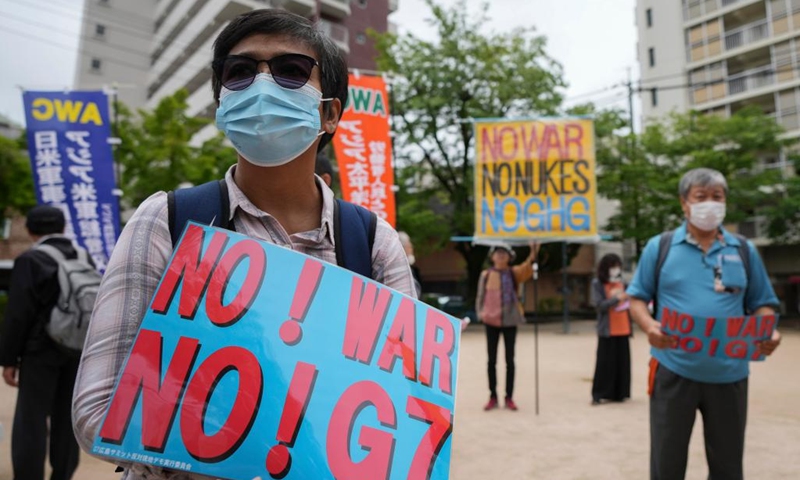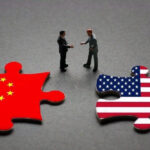China on Saturday slammed the Group of Seven (G7) for hyping up China-related issues in a communiqué and other documents adopted at the G7 Hiroshima Summit, saying what the bloc does is to hinder international peace, undermine regional stability and curb other countries’ development and China has lodged stern démarches to the summit’s host Japan and other parties concerned.
The G7 makes high-sounding claims about ”promoting a peaceful, stable and prosperous world”, but what it does is hindering international peace, undermining regional stability and curbing other countries’ development. That simply shows how little international credibility means to the G7, a Chinese Foreign Ministry spokesperson said in a readout released Saturday night.
“Despite China’s serious concerns, the G7 used issues concerning China to smear and attack China and brazenly interfere in China’s internal affairs. China strongly deplores and firmly opposes this and has made serious démarches to the summit’s host Japan and other parties concerned,” the Foreign Ministry spokesperson said.
The spokesperson reiterated that Taiwan is an integral part of China, and the resolution of the Taiwan question must be determined by the Chinese people.
The one-China principle is the solid anchor for peace and stability in the Taiwan Straits. The G7 keeps emphasizing cross-Straits peace, and yet says nothing about the need to oppose “Taiwan independence”. This in effect constitutes connivance and support for “Taiwan independence” forces, and will only result in having a serious impact on cross-Strait peace and stability, the spokesperson said.
Affairs related to Hong Kong, Xinjiang and Tibet are purely China’s internal affairs. China firmly opposes interference by any external force in those affairs under the pretext of human rights. The G7 needs to stop pointing fingers at China on Hong Kong, Xinjiang and Tibet and take a hard look at their own history and human rights record, the readout noted.
Regarding the situation in the East China Sea and the South China Sea, the spokesperson urged relevant countries to genuinely respect the efforts of regional countries in maintaining peace and stability, and refrain from using maritime issues to sow discord.
As for “economic coercion”, the massive unilateral sanctions and acts of “decoupling” and disrupting industrial and supply chains make the US the real coercer that politicizes and weaponizes economic and trade relations. We urge the G7 not to become an accomplice in economic coercion, the spokesperson said.
In response to G7’s flagging of China’s “accelerating nuclear arsenal,” the spokesperson said that China is firmly committed to a defensive nuclear strategy and has honored its pledge to “no first use” of nuclear weapons and always kept its nuclear capabilities at the minimum level required by national security. China is the only one among the five nuclear weapon states to have made those pledges. China’s position is above board and should not be distorted or denigrated.
The Chinese Embassy in Japan on Saturday also expressed strong opposition to G7’s irresponsible comments on China at G7 summit, urging G7 to reflect on itself and stop creating confrontations and divisions.
The Chinese Embassy in the UK and the Chinese Ambassador to Canada, Cong Peiwu, also fired back at G7’s manipulation of China-related issues, calling for abandoning Cold War mentality. They warned that any actions or statements that harm China’s interests will be met with a resolute and forceful response.
In a final communique issued at the G7 summit in Hiroshima, the bloc raised a series of concerns about China’s economic and military activities. But they also sought to “keep the door open to cooperation and avoid further inflaming tensions between the world’s second largest economy and the grouping of major Western powers,” the AFP reported on Saturday.
“We stand prepared to build constructive and stable relations with China, recognizing the importance of engaging candidly with and expressing our concerns directly to China,” the group said. “Our policy approaches are not designed to harm China nor do we seek to thwart China’s economic progress and development,” the statement continued, adding that the G7 countries are not “decoupling or turning inwards.”
The seemingly “milder” tone was not an act of confidence but reveals a sense of helplessness, experts said. Despite their attempts to decouple from China in key sectors, US decision-makers have come to realize that the situation is not unfolding as they anticipated. Their allies, including those in Europe, are most certainly unwilling to decouple with China due to the significant economic losses such a move would entail, Li Haidong, a professor at the Institute of International Relations at the China Foreign Affairs University, told the Global Times on Saturday.
Additionally, the US itself recognizes that achieving complete decoupling from China is an unrealistic goal at present, Li said.
The clash between the White House’s desire to decouple and the reality of their allies’ reluctance, combined with China’s sustained economic ties, has compelled them to adopt a more moderate stance. However, this moderation does not signify a permanent shift, but indicates an overall compromise that still awaits an opportunity to initiate the decoupling process, Li warned.
The Saturday communique also “laid out a raft of concerns about China’s economic and military activities,” the AFP reported. Slamming such topics related to China that would be exploited at G7 summit, the Chinese embassy in UK said that G7 in recent years has disregarded objective facts and grossly interfered in China’s internal affairs on issues related to Taiwan, Hong Kong, Xinjiang, Xizang, among others.
They have sowed discord among regional countries and fostered confrontation in the East China Sea and South China Sea. Some members of the G7 have disregarded the principles of a market economy and fair competition, and they have unjustly targeted Chinese companies, the embassy refuted.
The embassy further emphasized the need for the G7 to halt gross interference in other countries’ internal affairs, avoid forming confrontational alliances through exclusive circles, and refrain from creating divisions within the international community.
Another topic of focus revolves around the Ukraine crisis, as Ukrainian President Volodymyr Zelensky arrived in Hiroshima, Japan, on Saturday, bolstered by a major shift from US President Joe Biden, who told US allies that he would allow Ukrainian pilots to be trained on US F-16 fighter jets, according to a New York Times report.
Zelensky welcomed the “historic decision,” and wrote on Twitter that “Security and enhanced cooperation for our victory. Peace will become closer today.” shortly after his arrival in Japan.
Experts warned that Biden’s decision will only add uncertainty and conflict to the battlefield, making political negotiations or a peaceful resolution less likely in the foreseeable future.
“The US views Ukraine as strategically valuable as it becomes a proxy for the US and NATO against Russia in the ongoing war. This implies that the US will provide maximum assistance within its capabilities, including F-16 training and potentially more significant military aid in the future. However, this approach risks further provoking Russia and potentially escalating into a direct military conflict between the NATO and Russia, with grave consequences for the entire planet,” Li warned.
(Global Times)




